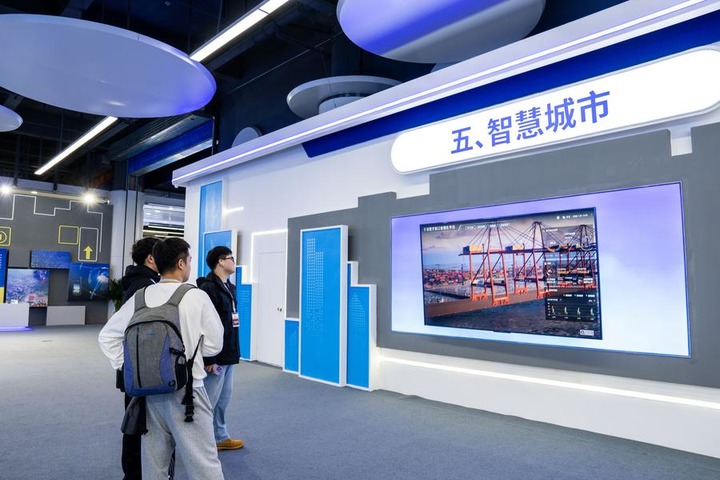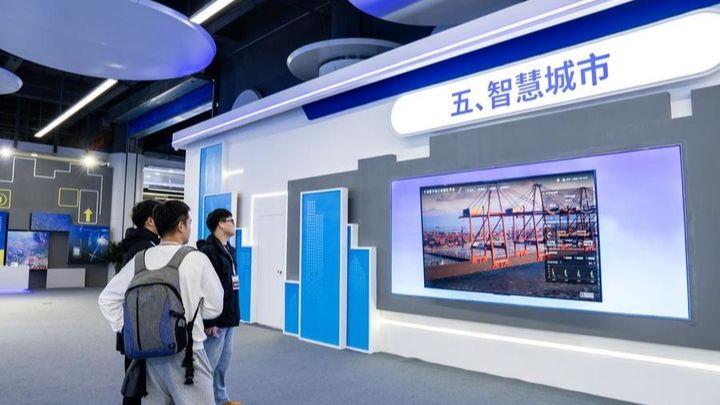
Visitors learn about the application of China's BeiDou Navigation Satellite System (BDS) on smart city during the second International Summit on BDS Applications in Zhuzhou, central China's Hunan Province, Oct. 26, 2023. (Xinhua/Chen Sihan)
BEIJING, July 25 (Xinhua) -- With years of efforts and emerging new technologies, China is actively promoting the construction of smart cities, supported by technological integrated development and diversified application of fundamental elements including data, artificial intelligence (AI) and 5G.
-- Multiple elements empower smart city construction
According to a plan for the overall layout of China's digital development released in last February, important progress will be made in the construction of a digital China by 2025, with effective interconnectivity in digital infrastructure. Such statement provides solid support for digital transformation of urban governance.
The country has been increasing investment in smart city construction in recent years. Global market research firm International Data Corporation (IDC) estimates that by 2027, China's investment in smart city information and communications technology (ICT) market will exceed 1.1 trillion yuan (about 151.47 billion U.S dollars).
Data from the Ministry of Industry and Information Technology shows that the number of 5G base stations in China had risen to nearly 3.92 million by the end of June, representing a net increase of 540,000 5G base stations over the end of last year. The country has seen continuous expansion of internet applications and abundant IPv6 resources, with the scale of computing power infrastructure among top of the world.
Such all-round layout of new basic elements and the integration of new technologies have provided new momentum for China's urban governance and smart city construction.
5G has penetrated into many fields of China's national economy and industries to improve production efficiency, said Yu Xiaohui, head of the China Academy of Information and Communications Technology, predicting that the country will further amplify the enabling role of 5G in various fields, whereas the combination of 5G and other technologies including AI will form new growth curves.
Looking from the key application scenarios of urban construction in China, large models, with technical advantages such as fast and accurate identification, logical deduction and prediction judgment, have been applied in various fields such as urban governance, public safety, traffic management and so on.
For instance, the service hotline platform built on the basis of large models has improved the efficiency of public services by 30 percent, by greatly shortening online queuing time, according to Chen Fengxian, a senior analyst at China Telecom Research Institute.
The integration of BeiDou and 5G has become a new hot spot in smart city construction, as the low-altitude economy has been defined as a new type of infrastructure of smart cities.
In the future, it is expected that Chinese cities will take BeiDou as a core to lay out a drone network in the low-altitude level and build a comprehensive operation system, as a bid to manage the real physical space through digital scenarios, said Zhou Chenghu, a member of the Chinese Academy of Sciences.
Experts believe that the digital transformation of Chinese cities has now entered the stage of integral intelligence. Taking the AI large model as an example, it has become a key technology to promote the innovation in concepts, means and models of urban governance, while profoundly changing the paradigm of urban governance toward being more refined and intelligent.
-- Multi-dimensional efforts to boost smart city development
It is believed that in the future, smart cities and urban governance will move towards a service model that features active identification and human-machine collaboration, generating more possibilities through innovation of new technologies.
To accelerate moving toward a smart future, experts suggest that investment should be increased from multiple dimensions to ensure safe circulation of basic elements, construction of digital infrastructure, and institutional innovation that is in alignment with digital transformation.
A critical move would be eliminating data barriers to promote unimpeded data circulation, which requires credible circulation systems. The technical measures and infrastructure have to be trustworthy and controllable.
It is necessary to improve the capability of governments, enterprises and other relevant organizations to identify data security risks, and build a comprehensive assessment system to ensure the security and reliability of different forms of data, said Ren Shuang, a professor at Beijing Jiaotong University.
Exploring institutional reforms that are suitable for digital environment requires strengthening innovation in urban operation and management. It includes public data management, laws and policies for authorized operations, as well as other systems to enable city data, especially public data, to fully realize normal operation, according to Ren.
At the same time, the integrity and synergy of the intelligent system of cities also plays a vital role. Experts pointed out that the smart city systems involve data fusion development, data communication and utilization, technical architecture transformation, management process optimization and so on.
In this new stage of comprehensive development, the construction of smart cities should pay more attention to the integrated coordination among various departments, businesses and systems, in a bid to further expand the depth and scale of smart cities in the future. (Edited by Yu Huichen with Xinhua Silk Road, yuhuichen@xinhua.org)




 A single purchase
A single purchase









